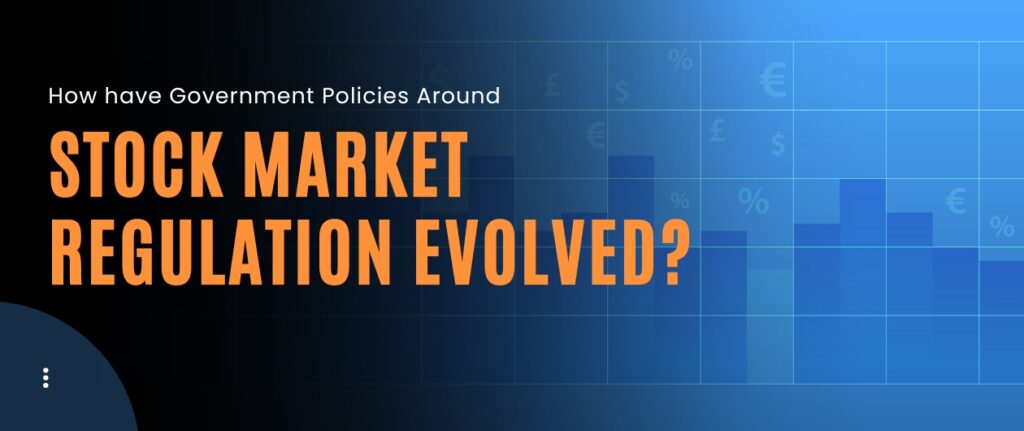
Stock market regulation refers to the rules and regulations put in place to govern the buying and selling of securities in the stock market.
These regulations intend to promote transparency, fairness, and stability in the market. These play a crucial role in maintaining investor confidence and ensuring the smooth functioning of the stock market.
Examples of stock market regulations include the Securities Act of 1933 and the Securities Exchange Act of 1934 in the United States, which established the Securities and Exchange Commission (SEC) to oversee the securities industry and enforce securities laws. Other examples include regulations governing insider trading, market manipulation, and the disclosure of financial information by publicly traded companies.
In the following section, let us look deeper at the various stock market regulations & policies.

Various Stock Market Regulations & Policies
There are various stock market regulations and policies that govern the buying and selling of securities in the stock market. Some of the key regulations and policies are as follows:
- Securities Act of 1933– This regulation requires companies to register securities offerings with the Securities and Exchange Commission (SEC) and disclose important information to investors.
- Securities Exchange Act of 1934– This regulation established the SEC and gave it the power to regulate securities markets and enforce securities laws.
- Dodd-Frank Wall Street Reform and Consumer Protection Act– This regulation was enacted in response to the 2008 financial crisis. It aims to improve accountability and transparency in the financial system.
- Jumpstart Our Business Startups (JOBS) Act– This regulation aims to make it easier for small businesses to raise capital by reducing regulatory burdens and providing exemptions from certain securities regulations.
- Insider Trading Regulations– These regulations prohibit individuals from trading securities based on non-public information they obtain during their employment or other professional duties.
- Market Manipulation Regulations– These prohibit individuals from engaging in fraudulent or manipulative practices that distort the market.
- Disclosure Regulations– These regulations require publicly traded companies to disclose certain financial and other information to investors, such as annual and quarterly earnings reports.
These regulations and policies play a critical role in ensuring the integrity and stability of the stock market. These aim at protecting investors from global investment risk and promoting economic growth.
Now that you have seen various types of market regulations, next, let us understand the objectives of these.

Objectives of Stock Market Regulation
Here are the main objectives of stock market regulation:
- Protect Investors- Stock market regulation aims to protect investors by ensuring access to accurate and timely information and preventing fraudulent or manipulative practices.
- Promote Fairness & Transparency- Regulations are designed to promote a level playing field for all market participants and to ensure that the market operates in a transparent and fair manner.
- Maintain the Financial System’s Stability- Stock market regulation helps maintain the financial system’s stability by monitoring and mitigating global investment risk and global investors’ risk.
- Control Market Volatility- Regulation helps control market volatility by ensuring that market participants act responsibly and ethically and by detecting and addressing factors affecting the market.
- Encourage Economic Growth- Effective stock market regulation helps encourage economic growth by promoting investment and giving investors confidence in the market.
Thus, stock market regulations aim to protect investors, maintain stability, and support economic growth. Next, let us look at how it affects the investment industry.

Impact of Stock Market Regulation on the Investment Industry
Stock market regulation significantly impacts the investment industry, shaping how investors and financial institutions operate in the marketplace. Here are some of the critical impacts of stock market regulation on the investment industry:
- Increased Transparency- Regulations promote transparency in financial markets by requiring issuers to disclose financial information to investors. This increased transparency leads to better-informed investment decisions.
- Greater Investor Protection- Regulations promote investor protection by prohibiting fraudulent activities and mandating the disclosure of material information to investors. This increases investor confidence and participation in the market, particularly in the case of large-value global investment.
- Increased Competition- Regulations that promote fair and open competition among market participants help to level the playing field for investors and increase market efficiency.
- Risk Mitigation- Regulations can help mitigate global investment risk by monitoring and controlling factors affecting international financial instruments, such as exchange rates, interest rates, and geopolitical events.
- Compliance Costs- Regulations increase compliance costs for market participants, particularly for smaller firms. This can create a barrier to entry, limiting competition and potentially reducing investor choice.
Overall, stock market regulation has a significant impact on the investment industry, with potential benefits for investors in terms of transparency, protection, and competition, as well as potential costs in terms of compliance and market entry.
Next, let us examine how different government policies around these regulations have evolved.

How have Government Policies Around Stock Market Regulation Evolved?
Over the past few decades, government policies around stock market regulation have evolved significantly. Two of the most significant legislation in recent years have been the JOBS Act and the Dodd-Frank Act.
The JOBS Act passed in 2012, was designed to make it easier for small businesses to raise capital by easing some regulatory burdens associated with going public. The act created a new category of securities offering known as the “crowdfunding” exemption, which allows companies to raise up to $1 million from individual investors without registering with the SEC. The act also raised the threshold for mandatory registration from 500 to 2,000 shareholders, making it easier for companies to stay private longer.
The Dodd-Frank Act passed in response to the 2008 financial crisis, introduced a wide range of regulatory reforms to increase transparency and reduce risk in the financial system. Among the key provisions of the act was the creation of the Consumer Financial Protection Bureau, which is responsible for protecting consumers from financial fraud and abuse, and the implementation of new rules around derivatives trading and credit rating agencies.
The evolution of government policies around stock market regulation reflects a growing recognition of the importance of balancing investor protection with market efficiency and innovation. While the JOBS Act and Dodd-Frank Act represent very different approaches to achieving this balance, they both reflect a desire to create a regulatory environment that promotes fair and transparent markets while also supporting economic growth and innovation.
In the following paragraph, let us look at how these changing regulations impact the broader investment industry.
If you need some ideas about what to read next, here they are:
- The Role of Family Members as Investors in Family Business: Strategies for Maximizing Returns and Minimizing Risks
- Managing Conflicts in Family Business: Strategies for Resolving Differences and Maintaining Harmony
- The Changing Landscape of Consumer Debt and the Relationship Between Consumer Debt and Recession Risk

How do Changing Government Policies & Regulations Impact the Investment Industry?
Changing government policies and regulations can have a significant impact on the investment industry, particularly in terms of global investment risk and the factors affecting international financial instruments. Here are some of the key implications of changing government policies and regulations on the investment industry:
- Compliance Costs – As government policies and regulations evolve, market participants are often required to comply with new rules and reporting requirements. This can increase compliance costs, particularly for smaller firms, which can limit competition and reduce investor choice.
- Investor Confidence – Regulations that promote transparency and investor protection can increase investor confidence and participation in the market. This can have a positive impact on the overall health of the investment industry.
- Risk Management – Regulations can help mitigate global investment risk by monitoring and controlling factors affecting international financial instruments, such as exchange rates, interest rates, and geopolitical events. This can help investors to manage risk better and make more informed investment decisions.
- Innovation – Changes in government policies and regulations can also promote innovation in the investment industry, particularly in the areas of financial technology and alternative investments.
- Market Volatility – Changes in government policies and regulations can also impact market volatility, mainly if they are unexpected or perceived as unfavorable by investors. This can create uncertainty in the market and potentially lead to increased risk.
Therefore, changing government policies and regulations can positively and negatively impact the investment industry, depending on the specific policies and regulations in question. Investors must stay informed about regulatory changes and their potential impact on their investments.
Next, let’s discuss the companies & industries that are affected by these changing stock market policies.

Companies & Industries Affected by Changing Stock Market Regulations & Policies
The following are some of the key companies affected by changing stock market policies:
- Financial Services Firms – Financial services firms, including banks and investment firms, are particularly affected by changing regulations. Regulations related to capital requirements, liquidity, and risk management can significantly impact their operations and profitability.
- Technology Companies – Technology companies are often affected by regulations related to data privacy and security, as well as regulations pertaining to intellectual property and antitrust. These regulations can impact their ability to innovate and compete.
- Healthcare Companies – Healthcare companies are often subject to regulations related to drug approval and pricing, as well as regulations related to patient privacy and data security. These regulations can impact their ability to develop and market new drugs and treatments.
- Energy Companies – Energy companies are often subject to environmental protection and resource management regulations. These regulations can impact their ability to extract and distribute resources and their profitability.
- Consumer Goods Companies – Consumer goods companies are often subject to regulations related to product safety, labeling, and advertising. These regulations can impact their ability to market and sell their products, as well as their liability in the case of product defects.
We have seen how various companies & industries are affected by changing stock market policies. Thus, it is vital for companies to stay informed about regulatory changes and their potential impact on their operations and profitability and to adapt their strategies accordingly.
In the final section, let us look at a wealth management company that broke records last year, owing to its excellent strategies.
The Bottom Line
Stock market regulation is a critical aspect of the investment industry, with important implications for investors, companies, and the broader economy. Government policies and regulations related to capital markets have evolved significantly, with notable examples including the Dodd-Frank Act and the JOBS Act. Changes to these regulations can greatly impact market volatility, compliance costs, investment opportunities, risk mitigation, and investor protection. As such, investors and companies need to stay updated about regulatory changes and their prospects.
Join Our Newsletter
Elevate your financial game & join the ranks of elite investors with Secvolt’s exclusive newsletter.
Join Our Newsletter
Elevate your financial game & join the ranks of elite investors with Secvolt’s exclusive newsletter.
Don’t just dream of wealth; achieve it with Secvolt. Schedule a call today for personalized guidance on your investment strategy and join the ultra-successful.
Ready to unlock your wealth’s truest potential & cherish affluence?
Secvolt, our hedge fund, sets the bar high with a record-breaking performance of 262% returns in 2022. With the brilliance of our highly advanced quant models and the efficiency of our risk mitigation protocols, we are yet to see a loss!
We’re the perfect ally to help you succeed financially and build the lasting legacy you have always aspired for.
Get in touch today. YOUR LEGACY AWAITS YOU…





